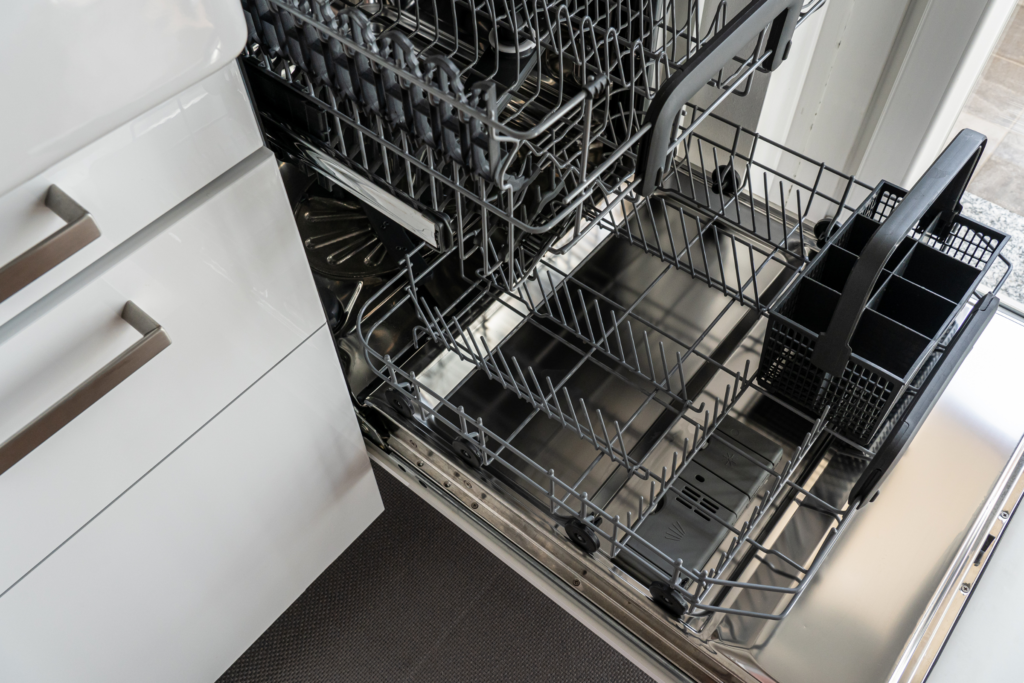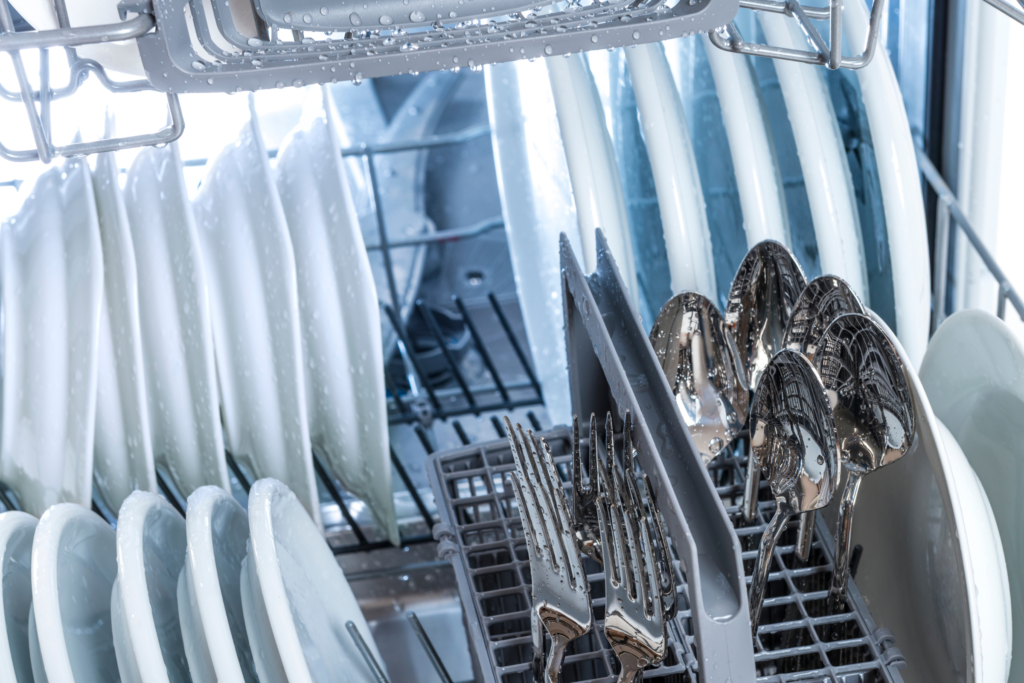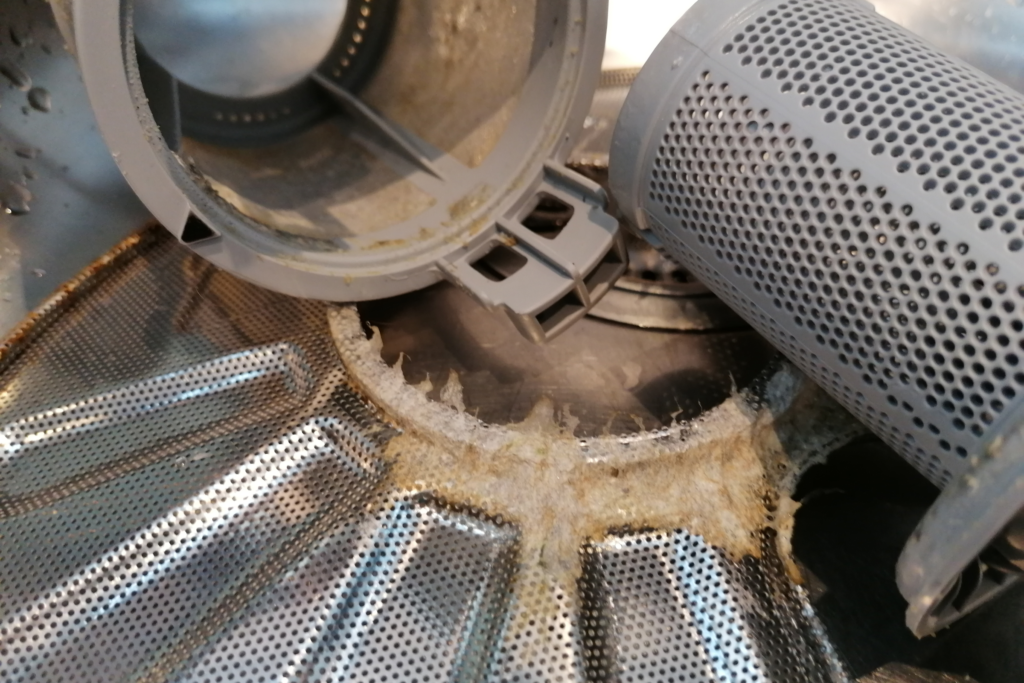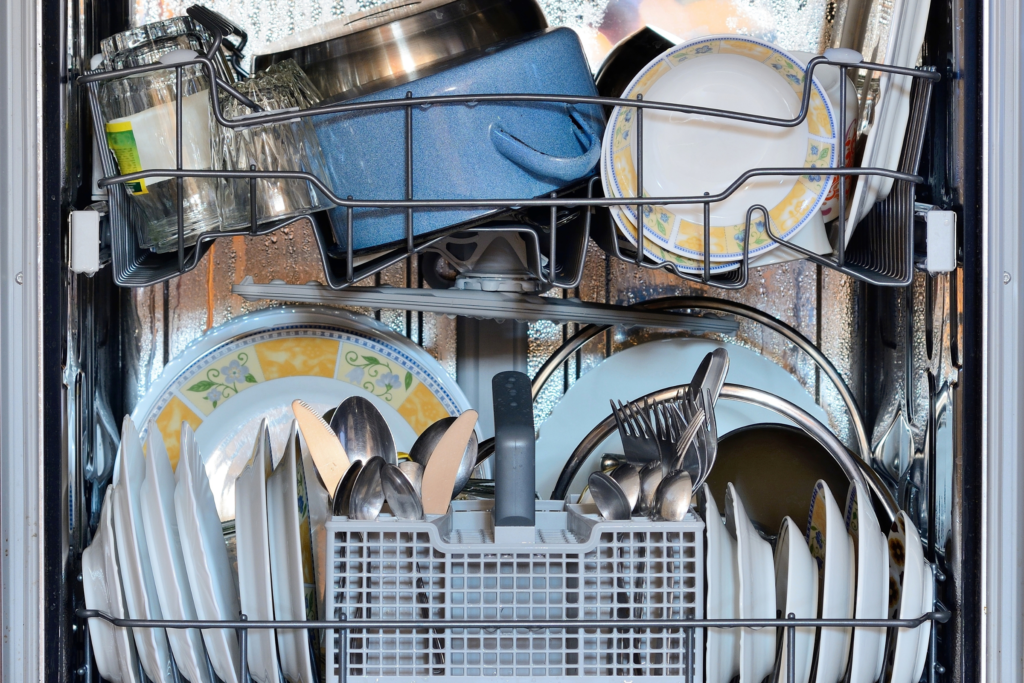Why Do New Dishwashers Smell? (With Tried and True Cleaning Methods!)
Have you ever noticed a strange smell coming from your brand new dishwasher? I know I have, and it had me puzzled.
New dishwashers often have a strange smell (like chemicals or burning plastic) the first few times you use them because of machine oil residues on the motor as well as coatings on the interior metal surfaces. While the smell will go away on its own as you use the dishwasher, you can get rid of the new dishwasher smell faster by cleaning the inside of the unit or running it a few times without dishes.
Since the smell in new dishwashers is mainly due to the manufacturing process, running a few empty cycles can help dissipate the odor.
To keep your dishwasher smelling fresh and clean in the long run, I recommend using vinegar as a natural cleaning solution. Running an empty cycle with a cup of white vinegar placed on the top rack can help eliminate any lingering odors and maintain the overall cleanliness of your dishwasher.
Remember, a little effort goes a long way in keeping your dishwasher odor-free and functioning efficiently.
Why do new dishwashers smell?
There are really only three reasons for that new dishwasher smell:
- Machine oils, varnish, or grease
- Burning plastic
- Chemical smells
You might also be asking things like:
- Why does my brand new dishwasher smell like rotten eggs?
- Why does my new dishwasher smell like sewage?
- Why does my dishwasher smell like burning plastic?

Machine oils, varnish, or grease
When I first started using my new dishwasher, I noticed a fishy or urine-like smell. I learned that this smell comes from the residues on the new motor coils.
As the dishwasher runs for the first time, these manufacturing residues get heated and release unpleasant odors. Fortunately, these smells are typically temporary and disappear after a few cycles.
Burning plastic
At times, I also detected a burning plastic smell from my new dishwasher. This could be due to small plastic components getting heated up during the initial use. Occasionally, plastic packaging or protective films might accidentally be left behind during the manufacturing process. These can smell when they come into contact with heat.
To prevent this, I made sure to inspect and remove any foreign materials from the dishwasher before its first run.
Chemical smells
In the beginning, I also experienced chemical-like smells from my dishwasher. I discovered this could be attributed to new parts or materials used in the appliance. Chemical smells often dissipate after a few wash cycles as the materials “wear in” and the manufacturing residues get washed away.
How to remove the odor from a new dishwasher
Fortunately, this doesn’t require a complicated solution.
To remove the odor from a new dishwasher, simply add detergent and run it without dishes 2-3 times. If your washer has special wash cycles that include high-temp sanitizing, add those to better vaporize and release the chemical odors. Check for odors during and after each wash cycle and repeat until you feel comfortable adding dishes.
Of course, once you’ve been using your dishwasher for a while, you are bound to notice other smells…

Other reasons that a dishwasher smells
Typically, there are three main reasons why a dishwasher smells once you’ve been using it for a while:
- Bacteria and mildew growth
- Food particles and residue
- Standing water and dampness
Bacteria and mildew growth
In my experience, one common reason for a smelly dishwasher is the growth of bacteria and mildew. This can happen because of the damp and warm environment inside the dishwasher. These microorganisms can cause unpleasant odors over time.
To prevent bacteria and mildew growth, I suggest regularly cleaning your dishwasher and leaving the door slightly open after each cycle to allow for proper air circulation and drying.

Food particles and residue
Another issue I come across is the buildup of food particles and residue in the dishwasher. These tiny pieces can get trapped in the filter or on the interior walls, leading to a persistent odor.
I recommend regularly cleaning the filter and wiping down the interior walls to remove any food residue. Additionally, always scrape off excess food from your dishes before placing them in the dishwasher. This will help minimize the buildup of particles and reduce odors.
Standing water and dampness
Lastly, standing water and dampness in the dishwasher can also cause foul smells. Clogged drains or drain pipes can lead to standing water, which can become a breeding ground for bacteria and other microorganisms. This not only causes unpleasant odors but also reduces the cleanliness of your dishes.
In my experience, I find it essential to check for any signs of drain clogs and address them promptly. Also, as mentioned before, leave the dishwasher door slightly open after each cycle to ensure proper drying and prevent dampness.
By addressing these common issues, I find myself enjoying a fresher-smelling dishwasher, and I hope these tips help you as well!
Effective remedies for common dishwasher odors
About once a month, I find it best to do a deep clean of the dishwasher to make sure that my dishes are coming out as clean as possible.
Vinegar Solution
Here’s what I like to do with vinegar to clean the dishwasher:
- First, I empty my dishwasher, making sure all dishes and utensils are removed.
- Then, I pour two cups of white vinegar into the bottom of the dishwasher.
- Next, I start the dishwasher cycle, making sure the vinegar mixes well with the water.
- After one or two minutes, I pause the cycle, allowing the vinegar solution to work its magic for about 20 to 30 minutes.
- Finally, I resume the cycle and let it complete. The vinegar does a great job of neutralizing odors and cleaning the dishwasher.
Baking Soda Treatment
Another method I have found useful for eliminating dishwasher smells is using baking soda. Here’s how I do it:
- Once again, I empty the dishwasher to ensure it’s free of any dishes and utensils.
- I then sprinkle one cup of baking soda evenly across the bottom of the dishwasher.
- I let the baking soda sit overnight for the best results.
- The next day, I run a hot water cycle, which allows the baking soda to break down any remaining food particles and odors.
Dishwasher Cleaner
Lastly, I find that using a dishwasher cleaner can effectively remove grease and food residue, which can cause unpleasant smells. For this, I follow these steps:
- I purchase a dishwasher cleaner, such as the Bosch dishwasher cleaner.
- I ensure that my dishwasher is empty and free from dishes and utensils.
- Next, I add one box of the cleaner to the bottom of the dishwasher.
- Then, I run the longest, hottest cycle, allowing the cleaner to work its way through the dishwasher.
By applying these methods, I have successfully eliminated unwanted odors from my dishwasher. Both the vinegar solution and baking soda treatment are natural, budget-friendly options, while the dishwasher cleaner offers a more specialized approach.
Proper Dishwasher Maintenance
In additional to regular cleaning, there are a couple of other normal maintenance duties that you should keep up with on your dishwasher:
- Filters
- Seals and lines
Filter
As a new dishwasher owner, I’ve learned that filter maintenance is crucial for preventing bad smells. Food particles and debris can get trapped in the filter, causing odors over time.
To clean the filter, I simply remove it from the bottom of the dishwasher and rinse it under running water. Using a soft brush, I gently scrub the filter to remove any stubborn debris. Make sure to check and clean your dishwasher’s filter at least once a month to ensure optimal performance and maintain a fresh smell.

Inspecting seals and lines
Lastly, it’s important for me to regularly inspect the seals and lines in my dishwasher. Mold and mildew can grow on the gasket seal, contributing to unpleasant odors. I use a cloth or soft brush dipped in warm, soapy water to clean the gasket seal, making sure to get into all the nooks and crannies.
In addition, I also check for any clogs in the dishwasher’s drain. A clogged drain can cause water to stagnate and create foul smells. By removing any visible debris and periodically running a cycle with a dishwasher cleaner, I ensure my dishwasher stays clean and odor-free.
Best practices for keeping your dishwasher running smoothly
Here are a couple more tips that I recommend using to keep your dishwasher from getting stinky or leaving your dishes dirty.
Using the right detergent
In my experience, using the right dishwasher detergent can make a huge difference in preventing smelly dishwashers. Some detergents are specifically designed to break down food particles and prevent build-up better than others. To avoid that unpleasant dishwasher smell, I recommend trying a high-quality detergent that’s specifically designed for dishwashers. This can help ensure the dishes come out clean and minimize the potential for bad odors.
I have also found that using a rinse aid can help to prevent water spots and residue from building up inside the dishwasher. Not only does this keep my glasses and dishes looking sparkling clean, but it also helps prevent that musty smell from forming inside the machine.
Don’t overload the dishwasher
Another key factor in keeping my dishwasher smelling fresh is monitoring its use. I have learned that overloading the dishwasher can contribute to a smelly dishwasher, so I try to load it properly by following the manufacturer’s recommendations. This ensures there is enough water flow and heat to effectively clean the dishes and not leave lingering food particles.
I also make it a point to regularly check and clean the dishwasher filter. A clogged filter can cause water to not drain properly, leading to smells and poor dishwasher performance. To clean the filter, I remove it and rinse it under running water. Doing this every few weeks helps to prevent unpleasant odors and maintain the dishwasher’s efficiency.

Essential oils
One trick I like to use for keeping my dishwasher smelling fresh is adding a few drops of essential oil to the dishwasher. Essential oils like lemon, orange, or lavender not only add a pleasant scent to your dishwasher, but they also have antimicrobial properties that can help combat odor-causing germs.
You can simply add 5-6 drops of your favorite essential oil to the detergent compartment or drizzle it onto a dishwasher-safe dish and place it upright for a boost of sweet aromas:
- Lemon: Has a strong citrus scent and is a natural deodorizer
- Orange: Offers a sweet, refreshing aroma that is both invigorating and calming
- Lavender: Provides a nice floral scent and is known for its antibacterial and antifungal properties
Remember not to overdo it with the essential oils, as adding too much can be overpowering or even damage your dishwasher.
Air drying
Another tip I’ve found useful for maintaining a fresh-smelling dishwasher is to practice air drying. Instead of relying solely on the dishwasher’s heat drying function, I like to open my dishwasher door after the cycle has completed and allow it to air dry for a bit. This helps to evaporate any lingering dampness and reduces the likelihood of musty odors developing within the machine.
Here’s how to do it:
- After the dishwasher cycle has finished, turn off any heat drying setting
- Wait for a few minutes to let the heat and steam dissipate
- Open the dishwasher door and pull out the racks slightly to allow for better airflow
- Let the dishwasher air dry for 1-2 hours or until the dishes are completely dry
Let Us Know How We’re Doing!
Did this expertly prepared resource answer your question?
Do you have another question about home maintenance, home improvement projects, home appliance repair, or something else?
Get more information, send in questions and keep the discussion going by contacting the I’ll Just Fix It Myself company customer service team at at 1-800-928-1490 or Email us at [email protected]
